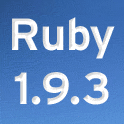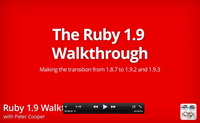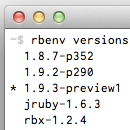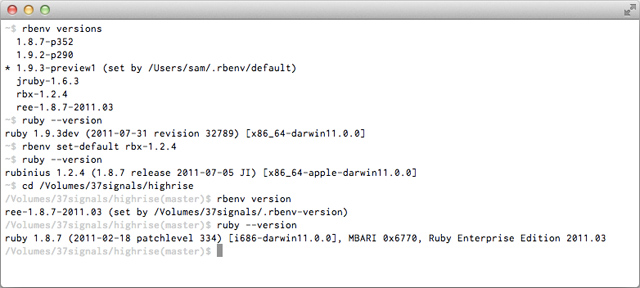 On August 1, 2011, Ruby 1.9.3 preview 1 was released. The final version isn’t yet out (as of September 23) but Ruby 1.9.3 is going to be the next, full production-level release of MRI Ruby. But what’s the deal with 1.9.3 (and its successors, Ruby 1.9.4 and 2.0)? Keep reading!
On August 1, 2011, Ruby 1.9.3 preview 1 was released. The final version isn’t yet out (as of September 23) but Ruby 1.9.3 is going to be the next, full production-level release of MRI Ruby. But what’s the deal with 1.9.3 (and its successors, Ruby 1.9.4 and 2.0)? Keep reading!
The Summary
Ruby 1.9.3 is a relatively minor improvement on the Ruby 1.9.2 we already know and love. In short:
- a focus has been placed on performance with file loading, File and Pathname all significantly improved
- Ruby 1.9.2 mostly fixed down the language specification for 1.9; 1.9.3 is mostly work on a ‘better implementation’
- you can tune the garbage collector via environment variables (more on this in a post coming soon!)
- Ruby’s license changes from dual Ruby + GPLv2 to dual Ruby + 2-clause BSD
- improved GC performance with a lazy garbage collector
- a ‘better strategy’ for the GIL / GVL
- test/unit supports parallel testing
- Random.rand tweaks (and rand() now accepts ranges)
- io/console, a new library in the stdlib
- 4 new encodings (so far) – cp950, cp951, UTF-16, and UTF-32
- extra String methods
- a number of tweaks to formatting strings
- Module#private_constant and Module#public_constant
- a smattering of other bits and pieces, but this is the TLDR overview!


 Despite
Despite  It seems the Ruby and Rails job scenes are on fire! I don’t remember running so many jobs across a single month before. 22 Ruby and Rails jobs are here and they’re spanning the world. US West Coast, East Coast, England, Scotland and Germany are all represented. It’s definitely not the common “San Francisco or nothing” roundup :-)
It seems the Ruby and Rails job scenes are on fire! I don’t remember running so many jobs across a single month before. 22 Ruby and Rails jobs are here and they’re spanning the world. US West Coast, East Coast, England, Scotland and Germany are all represented. It’s definitely not the common “San Francisco or nothing” roundup :-)

 In the past couple of months I’ve seen situations arise where developers aren’t entirely sure how Ruby has chosen to interpret their code. Luckily, Ruby 1.9 comes with a built-in library called Ripper that can help solve the problem (there’s a 1.8 version too, see later). Here, I give the 30 second rundown on what to do.
In the past couple of months I’ve seen situations arise where developers aren’t entirely sure how Ruby has chosen to interpret their code. Luckily, Ruby 1.9 comes with a built-in library called Ripper that can help solve the problem (there’s a 1.8 version too, see later). Here, I give the 30 second rundown on what to do. Official project sites should set the benchmark for standards relating to that project in terms of the best quality and most up to date news updates, documentation, download links, tutorials, and so forth. On this front, Ruby’s official site at
Official project sites should set the benchmark for standards relating to that project in terms of the best quality and most up to date news updates, documentation, download links, tutorials, and so forth. On this front, Ruby’s official site at  Over on the
Over on the  I don’t like being negative on Ruby Inside without good reason. Trivia like
I don’t like being negative on Ruby Inside without good reason. Trivia like  Over at the always-riveting official Ruby blog, Shota Fukumori
Over at the always-riveting official Ruby blog, Shota Fukumori  The Ruby and Rails job scene continues to grow through 2011 and we’ve got *drumroll* 13 (lucky for some) jobs to share from the
The Ruby and Rails job scene continues to grow through 2011 and we’ve got *drumroll* 13 (lucky for some) jobs to share from the  Amazon has unveiled
Amazon has unveiled 
 Ruby Inside wouldn’t be what it is without you but it’s time for me to thank the companies who also help to keep Ruby Inside going by sponsoring my work. Thanks!
Ruby Inside wouldn’t be what it is without you but it’s time for me to thank the companies who also help to keep Ruby Inside going by sponsoring my work. Thanks!
